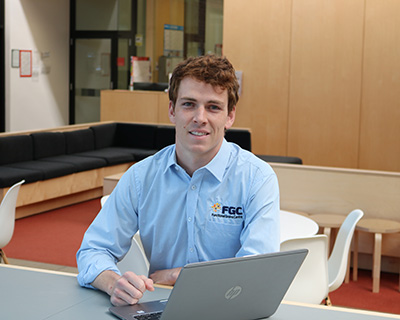Cracking the problem of how to grade for rice quality at the delivery point
Developing a model to allow for rice to be graded on the basis of quality at the point of delivery is the focus of new PhD candidate Mr Allister Clarke.
 Mr Clarke’s research through the Functional Grains Centre (FGC) and the Food Agility Cooperative Research Centre (CRC), aims to boost returns to the rice industry by allowing for better storage and milling as a result of grain segregation.
Mr Clarke’s research through the Functional Grains Centre (FGC) and the Food Agility Cooperative Research Centre (CRC), aims to boost returns to the rice industry by allowing for better storage and milling as a result of grain segregation.
“Australian rice growers are paid based on the milling quality of their deliveries, in particular the whole grain yield (WGY) which represents the percentage of grains that break during milling.
“But it takes approximately five months for growers to find out how their deliveries have been graded, creating a delay in grower delivery payments and inhibiting quality based segregation through storage.
“This project aims to generate a prediction model that would allow for the grading of a load, based on rice quality, at the delivery point.”
Making use of data science
To develop the predictive model Mr Clarke will apply data mining techniques and machine learning algorithms onto historical production datasets.
“This will include data on farm management, environmental conditions, grower deliveries and grain quality appraisals,” Mr Clarke said.
“The ability to classify a delivery prior to milling gives the industry the ability to segregate loads based on quality and then plan their milling operation around this.
“The large difference in price between whole and broken grains means even just a couple of percent decrease in broken grains, through better management of storage and milling, would bring large amounts of revenue back to the industry,” Mr Clarke said.
Mr Clarke says the benefits to the grower will also come from using the knowledge extracted from the model to drive an increase in production of premium Australian rice sold into high-value markets.
“Having a better understanding of the factors that affect WGY would better inform decisions on farm, allowing for improved management for rice quality and profit,” Mr Clarke said.
“I hope this research will provide an opportunity for the industry to offer better prices back to the grower will improve the competitiveness of the crop and the success of the industry in the Riverina.”
PhD combines interests in rice and machine learning
Mr Clarke is no stranger to the rice industry after growing up on a farm near Finley in the heart of the Murray rice production area.
He studied a Bachelor of Science in Agriculture (Honours) at the University of Sydney.
“During my undergraduate studies I specialised in Ag Economics and then in my Honours year I began working with machine learning models and data mining for rice quality.
“This project really gave me an introduction into predictive modelling and rice quality as well as the idea of looking into it further through a PhD.
“While studying up in Sydney, I was also fortunate enough to attend two study trips to South East Asia. Once in Vietnam and the other in Laos.
“These tours allowed me to gain a greater appreciation of the importance of rice in these communities and for myself an insight into the role of research and development for these producers and their families.
As a recipient of the Ricegrowers’ Association of Australia ‘Greg Graham Memorial Scholarship’ Mr Clarke gained a greater understanding of rice quality and the importance of premium Australian rice production to the SunRice business.
Mr Clarke is supervised by Associate Professor Dan Waters, Professor Chris Blanchard and Associate Professor Zahid Islam from Charles Sturt and Russell Ford from SunRice.
- ARC Industrial Transformation Training Centre for Functional Grains
- News
- Newsletter Archive
- 2019
- Issue 3 2019
- Cracking the problem of how to grade for rice quality at the delivery point


